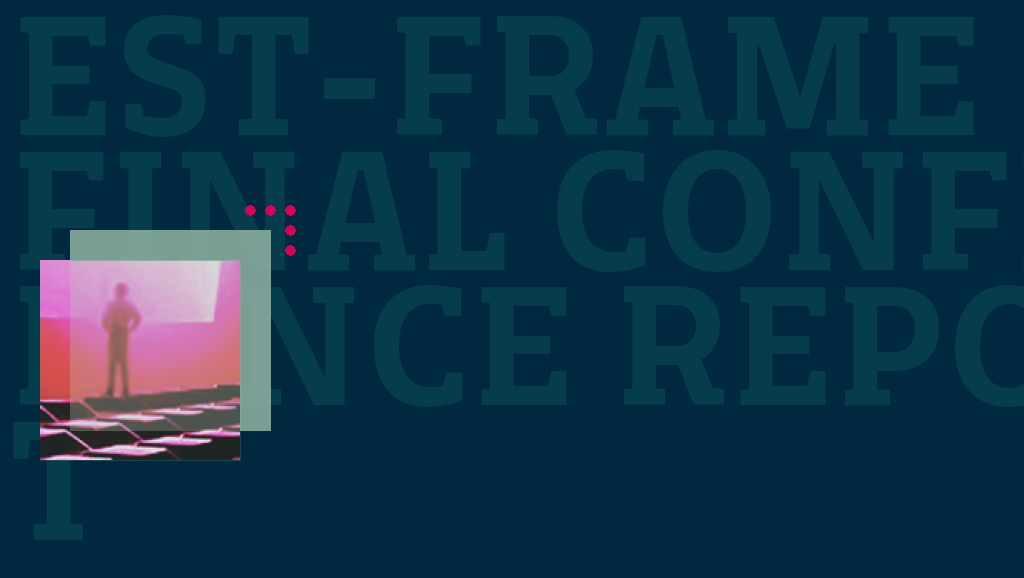On December 2 the EST-Frame Final Conference took place in Brussels Belgium. The conference was entitled “Assessing emerging technologies – Towards an integrated approach“. The program can be found here.
In his short welcome speech and introduction, Thomas Reiss explained that assessments tools are needed because of questions about ethics. He argued that assessments may come to different conclusions, and raised the question of how problematic such results might be. He went on to highlight how (in his opinion) assessment is becoming more difficult and that there may be a problem with assessors becoming more detached from their objects of study.
He continued by arguing that the outcomes of assessment may be good in terms of results but also lead to uncertainty. Results differ and topics to address are under discussion, concluding by describing the presentation that was to follow as an attempt to address these issues as it presents the need for an integrated approach.
EST – Frame coordinator Ellen-Marie Forsberg then took the floor. In ‘On the needs for integrated assessments and on TranSTEP as one way to proceed’, Forsberg first offered a brief history of the project before going on to describe its work and methodology. The project involved 4 empirical studies with the aim of comparing assessment frameworks. Further details can be found on the project website. A special section of the Science and Public Policy journal (Volume 42, issue 3, june 2014) contains a series of papers that present the project findings for interested readers.
She then moved on to describe the project findings, before offering an in depth description of their TranSTEP assesment tool.
TranSTEP – Trans-domain Technology Evaluation Process , is a tool whose aim is to get an integrated perspective on complex technology issues by teaming up across established assessment communities. It is a conceptual guide that focuses on communication and interdisciplinary learning enhancement in a trans-domain approach. The process involves collaborative situation analysis, transparent method reflection, and a continual use of facilitated dialogue.
The EST-Frame website events page linked above contains a link to the presentation slides, and an overview of the project is available here.
In the next intervention, Philippe Gallay of DG Research and Innovation outlined the development of EU proposals in the field, stressing the importance of complexity within the process. He described RRI practices as seen from the European commission viewpoint, citing engagement, gender equality, science education, ethics and open access to information as components of a responsible model.
Sissel Rogne, Director of the Norwegian Biotechnology Assessment Board followed describing her practical experiences of working in the assessment field and describing what she called a ‘science-society contract’. This was a compelling speech that highlighted many aspects of decision-making and policy recommendation that are not often accessed.
Christopher Then of TestBiotech followed with a lively and provocative speech from the perspective of an NGO. He raised the issue of the dimension of non-knowledge, be it accidental or deliberate (political), arguing that research is largely carried out by industry and is not transparent. He argued that many respected journals have backing from industry, that conflicts of interest are not declared (never mind addressed) and that research should be driven by those who doubt, not those who promote and develop technology.
He concluded by saying that we could not tell which organizations could be trusted, something that he was questioned upon by some from the floor. A provocative view that brought some fire to the afternoon, once more an interesting and seldom heard position.
Karel Haegeman of the European Commission delivered the final speech before the panel discussion. He raised many question about the future of integrated assessment and set the tone for the discussion.
The panel discussion was preceded by comments from Jens Hoegel, in which he offered an incisive description of how assessments can be incomplete and raised the question of how to improve upon current practices. Due to time constraints the discussion was rather short but once more many interesting points were raised about the role of politics, research and researcher choices and other related matters.
This was an enjoyable and well attended conference that we at the Foundation are sure will lead to a great deal of interdisciplinary collaboration and interesting work as the TranSTEP tool is rolled out and further developed. Photos of the event are available through the Foundation Flikr account.
Some photos of the event
—————–
















